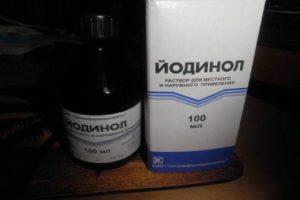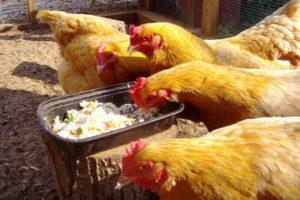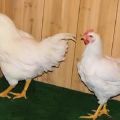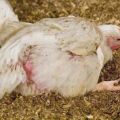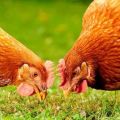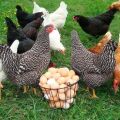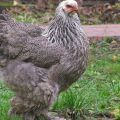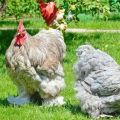Scheme and rules for vaccination of chickens at home, vaccination table
Timely vaccination of chickens is considered a guarantee of their health. Thanks to the correct implementation of the necessary vaccinations, it is possible to protect birds from a variety of infectious and viral pathologies. At the same time, many poultry farmers ignore this important event, which leads to dangerous consequences. As a result, the productivity of birds decreases or even their death occurs.
Content
- 1 Why vaccinate chickens and adult birds?
- 2 What vaccinations are given?
- 3 What are they vaccinated against?
- 4 How to find a vaccine
- 5 Calculation of vaccine dosage and amount of water
- 6 How to vaccinate chickens and chickens?
- 7 Approximate scheme for vaccination of poultry
- 8 Monitoring vaccination results
Why vaccinate chickens and adult birds?
Vaccination is considered the most effective method for preventing various diseases. Moreover, the prevention of pathologies is much easier than their treatment.
Vaccination can be specific or non-specific. In the first case, the implementation of vaccinations is aimed at preventing infection. In the second, measures are taken to stop the spread of the disease in a timely manner.
Quite often, vaccines have to be administered in the first days of the chicks' life. However, a more accurate schedule should be drawn up by the veterinarian. With the introduction of special drugs, it is possible to prevent smallpox, Newcastle and Marek's disease and many other ailments.
What vaccinations are given?
The procedure is performed in different ways. All vaccinations are divided into 2 categories - specific and non-specific.
Specific
This term refers to vaccinations that are performed with the help of special medicines. To do this, dead or weak strains of microorganisms are introduced into the bird's body. This leads to the synthesis of antibodies. This type of vaccination is used on large farms with significant livestock.
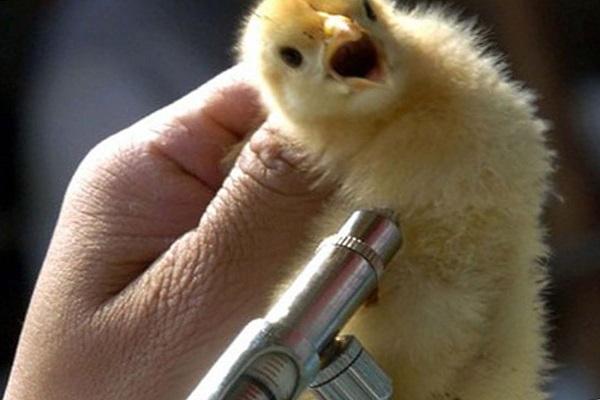
Non-specific
This is a standard technique based on preventive measures. It is as follows:
- the introduction of vitamins into the diet;
- isolation of infected chickens;
- assessment of the health status of birds;
- quarantine of chicks and recently purchased individuals;
- treatment in case of the development of the disease.
This method requires the poultry farmer to pay more attention to the chickens. Therefore, it is usually used for small farms. In the case of non-specific vaccination, antibodies are not synthesized in the body of birds. The procedure is aimed at strengthening the immune system and increasing disease resistance.
What are they vaccinated against?
Vaccination is aimed at preventing various diseases. In some cases, a single injection of the drug is enough, in others, the drugs are used constantly.
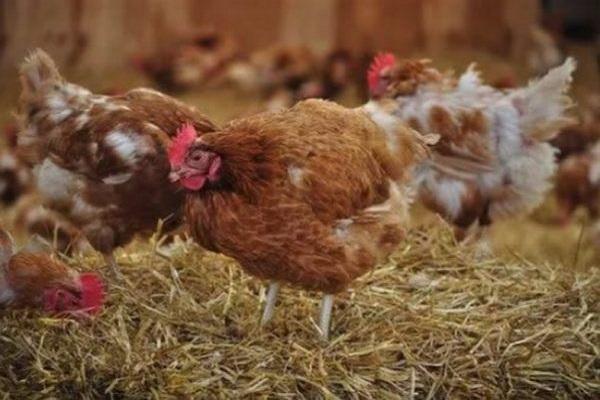
Full time
In such a situation, drugs are recommended to be administered annually. In some cases, it is necessary to use a complex of different means that are used in the early stages. The exact timing of vaccinations is very difficult to determine. When choosing them, it is worth considering the general indicators of morbidity in the economy and the region.
For bronchial infections
This category of pathologies includes different types of infectious bronchitis. The disease provokes a decrease in the general tone of birds. As a result, there is a decrease in weight and egg production parameters. Pathology is life-threatening for birds.
Vaccination is recommended in several stages:
- at 5 weeks use the medicine Intervent MAS / clone, which is mixed with clean water;
- at 8 weeks, the composition Intervent IB4 / 91 is introduced - it is also diluted in water;
- at 10 weeks, Intervent MAspas / clone 30 is used, which is administered by injection;
- Fort Dodge IB Primer D274 is applied at week 11;
- Before selling poultry, use Intervent IBmulti + ND + ED.
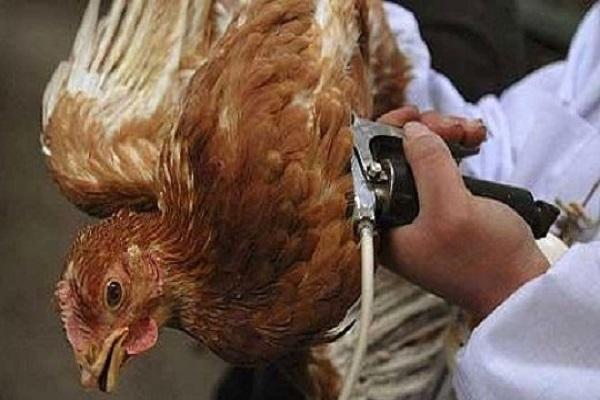
For salmonella
Salmonellosis is considered one of the most common diseases among domestic chickens. Infection is transmitted through the oviduct and poses a danger to the human body. It is worth administering the vaccine against the disease many times:
- for 1-2 days of life, give Lohmann TAD VacE, which is mixed with water;
- at 6 weeks it is recommended to use the same medicine;
- the last time the drug is administered before sale or one month before slaughter.
From the plague
This vaccine is given at 3-6 weeks. The procedure is recommended to be repeated every year. For vaccination, a 20% suspension of formol-hydroxyl-aluminum serum is used. There is also a more expensive and effective formol-embryo vaccine, which is used at the same age.
From adenovirus
This infection provokes a decrease in egg production. To prevent infection with the virus, Intervent IBmulti + ND + ED is administered. It is used only for chickens after 2-2.5 months.
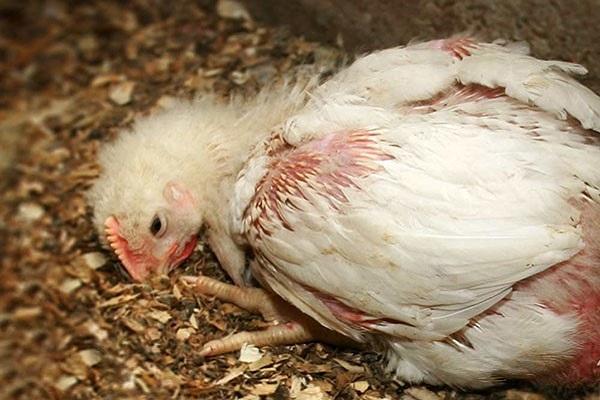
One-time
The body's resistance to specific strains of bacterial microorganisms and viruses can be maintained for life. For this, a single use of the vaccine is enough. In this situation, the immune system "remembers" the pests. When faced with them, the blood cells neutralize the danger before the infection spreads. In this case, it is important to get vaccinated on time.
Coccidiosis
It is worth vaccinating against this disease immediately after the birth of the chicken. In industrial incubators, birds are vaccinated on the first day. In adults, the vaccine will not work. For the procedure, coccidiostatic drugs are used. They are added to poultry feed.
Newcastle disease
Today, the same serum is used for the prevention of the disease as for the prevention of bronchial pathologies - Intervent MAspas / clone 30. The drug is administered by injection.
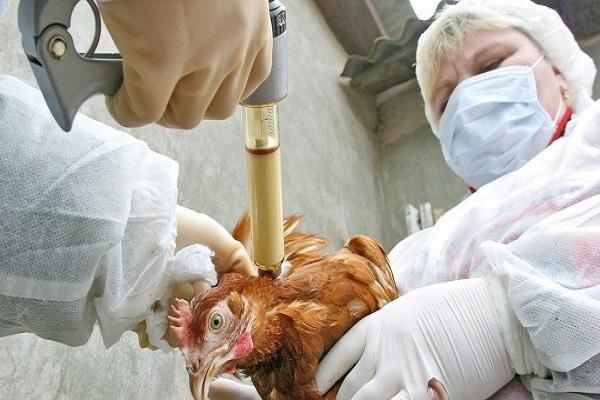
Laryngotracheitis
For the prevention of disease, the drug Merial Nemovac is administered by mixing with water. The vaccine is done at 9-10 weeks of age. The causative agent of laryngotracheitis is resistant to primary avian antibodies. Therefore, at the time of administration of the vaccine, the chicken must be completely healthy. Otherwise, the threat of infection is high.
Marek's diseases
Only incubator vaccination helps to prevent Marek's disease. It is done immediately after the chickens are born or no later than the first day of life.
How to find a vaccine
To find an effective drug, you need to consider many criteria. Only in this case will the vaccination be effective.
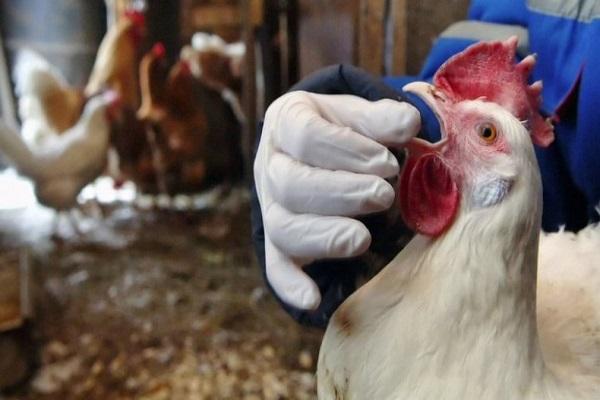
Common parameters
Vaccinations for hens can be mandatory or optional.In the second case, the decision on the appropriateness of vaccination depends on the following factors:
- the opinion of the poultry farmer - a desire for precautions or a tendency to save;
- place of purchase of birds;
- the purpose of breeding birds;
- epidemiological situation in the region.
Human factor
If a farmer is prone to economy, he is willing to take a certain risk. In such a situation, only mandatory vaccines are given. At the same time, it is important to monitor the condition of the birds so as not to miss the development of the disease. Cope with the disease at the initial stage is much easier.
Be sure to be honest with your customers. They should be informed about the vaccinations given to the chickens.
If the poultry farmer wants to protect his livestock from diseases as much as possible, it is worth doing optional vaccinations.
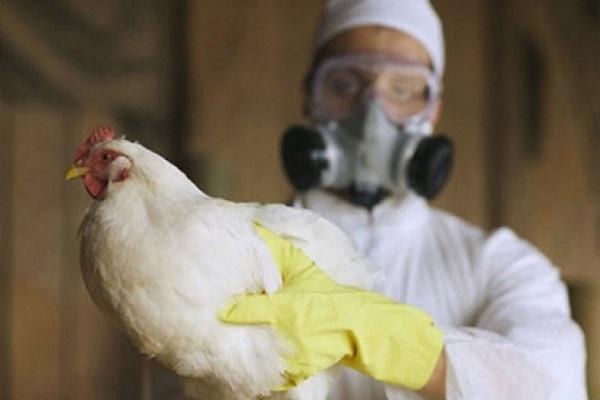
Farm location
In the absence of a specific infection on the farm or in the area, it is not necessary to vaccinate against it. To determine the list of dangerous diseases, it is worth contacting the appropriate body - the state veterinary clinic. It is there that you can get information on the prevalence of pathologies among birds.
It is worth checking for diseases that occur in neighboring areas. Chickens have an accelerated metabolism. Therefore, they get sick very quickly. This means that the infection can spread quickly in the surrounding area. In such a situation, it is recommended to play it safe.
Productive focus of chicks
The list of vaccines for laying hens and broiler breeds is different. Meat poultry does not need to be vaccinated against adenovirus, because this infection leads to a decrease in egg production.
It should be borne in mind that among meat breeds, the disease spreads faster. They live in closer conditions than egg chickens. The list of specific vaccinations depends on specific characteristics.
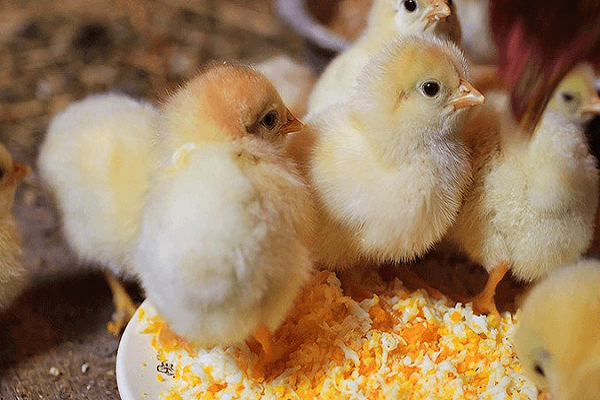
Place of purchase
Vaccination can be resolved by purchasing chickens. If purchased from a poultry farm, you can be sure that the required minimum vaccinations are carried out.
If birds are bought from individuals in small farms, it is worth focusing on their conscientiousness. Therefore, the issue of vaccination availability must be clarified in advance. It should be borne in mind that well-grown and fully vaccinated chickens cannot be cheap.
Calculation of vaccine dosage and amount of water
The number of doses of the drug should coincide with the number of birds on the farm. Some of the drug will be lost in the medicator and in the water line. Therefore, it is worth increasing the volume by 300-700 doses per house.
Calculating the number of vaccines is not so difficult. If you need to vaccinate 23,500 chickens, you should take 6 vials of the drug, 4,000 doses each. As a result, 24,000 doses per house will be required.
To get the amount of water, you need to use the formula. To do this, the number of chicks should be multiplied by their age in days and by 1.6. The last figure is the percentage of input at the dispenser.
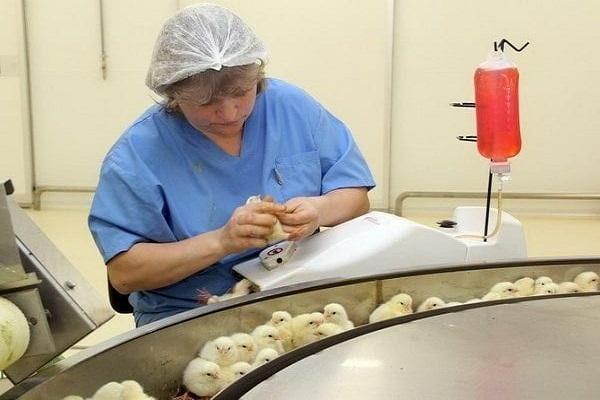
The calculation of the required amount of clean water should be handled by a veterinarian or a qualified nurse. This is done right in the chicken coop before making the solution.
How to vaccinate chickens and chickens?
To vaccinate chickens and broilers at home, you need to focus on many factors. The table shows a graph by age from different diseases:
| Name of the disease | Age of chickens |
| Marek's disease | 1-3 days |
| Salmonellosis | 1-2 day |
| Coccidiosis | 5-7 days |
| Gumboro disease | 20-25 day |
| Infectious bursitis | 28-30 day |
| Newcastle disease | 5 weeks |
| Salmonella Enterica | 6 weeks |
| Mycoplasmosis | 7 weeks |
| Infectious rhinotracheitis | 9 weeks |
| Infectious encephalomyelitis | 13 weeks |
| Colibacillus | before sale over 2 months old |
| Egg Drop Syndrome | older than 2-2.5 months |
| Infectious bronchitis | 7-8 weeks |
Certain pathologies require repeated administration of the drug.To avoid the development of ailments, you need to carefully study the instructions and consult an experienced doctor.
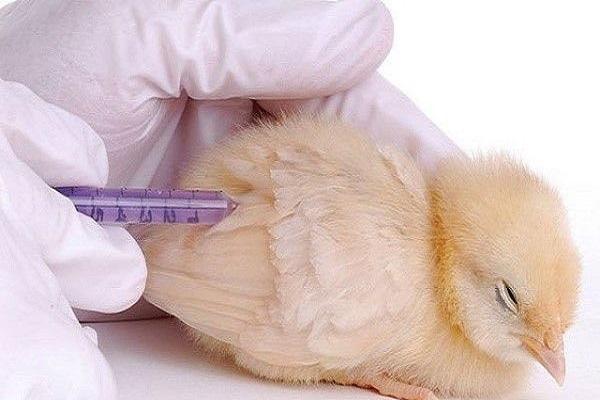
Approximate scheme for vaccination of poultry
To achieve good results during vaccination, it is worthwhile to strictly follow the sequence of administration of drugs.
Intramuscular
With the introduction of the drug by this method, it will not be possible to do without an assistant. Intramuscularly use means to reduce egg production and Marek's disease. To carry out the procedure, you should follow these steps:
- Prepare the drug. It needs to be taken out of the ice and a daily dose of the drug should be drawn into an insulin syringe.
- Secure the bird so that it cannot escape.
- Find the injection zone on the chest. Typically, the injection is performed 2.5-4 centimeters from the keel bone.
- Wipe the area with a cotton pad moistened with alcohol.
- Insert the syringe at a 45 degree angle. The depth should be 1-1.5 millimeters. Press down gently on the plunger to ensure smooth injection of the substance.
- If a drop of blood appears, disinfect the injection area again.
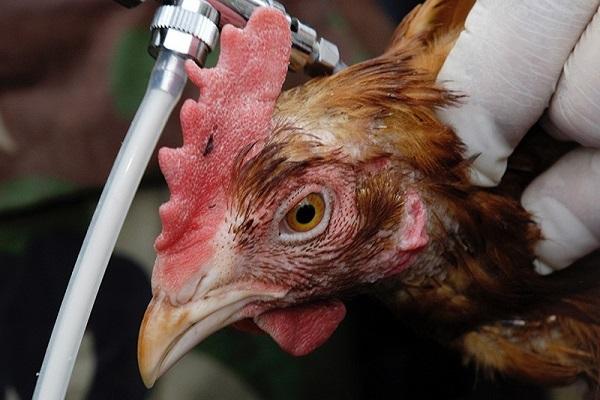
By instilling in the eyes of a chicken, layer, chicken
When using the tool using this method, you need to do the following:
- Prepare medicine. Remove the drug and solvent from the bottle, and then draw them into a pipette.
- Fix the chicken by paying attention to the head.
- Instill 0.03 ml of the drug in the eyes.
- Hold the chick to allow the solution to enter the body.
Breeding in water
In this case, do the following:
- Drinkers should be disposed of at a certain time before vaccination. Birds should be thirsty by the time the drug is administered.
- Mix the drug with water according to the instructions.
- Give the chickens access to the drinking bowl immediately afterwards.
- Make sure that the hens drink the solution in 1.5-2 hours, otherwise it will become ineffective.
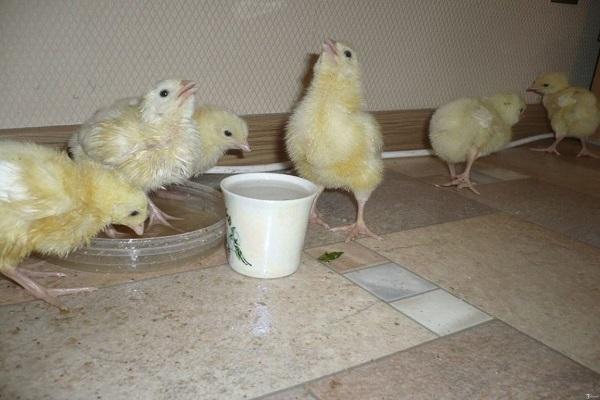
With a sprayer
To implement this method, you should take the following steps:
- Dilute the substance according to the instructions. 100 chicks will need about 50 ml of water.
- Spray chicks using a coarse or fine spray.
- Make sure that the product gets on all birds.
This method is often used on large farms, as it helps to plant an impressive number of birds..
Introducing the drug into the wing
To carry out the procedure, you should do the following:
- Prepare a vaccine.
- Fix the chicken. To do this, you need to hold your head with your thumb, and with your middle and index fingers, take the wing to the side.
- Wipe the injection site with alcohol.
- Inject at an angle of 30 degrees. It is recommended to press the piston very slowly.
- There is a risk of a bubble in the area of the injection. Over time, it will pass on its own.
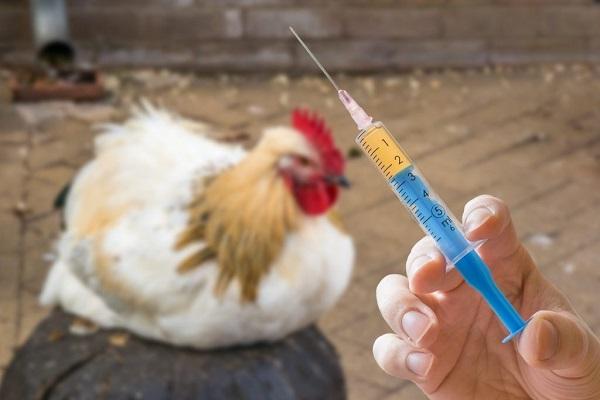
Monitoring vaccination results
In the poultry industry, the quality of the vaccine is certainly controlled. To do this, you should follow these steps:
- Take 20 chickens from different locations.
- Check the shade of the tongue - it should be blue.
- Vaccination is considered carried out if at least 90% of birds have a blue-tinged goiter and tongue.
Empty containers that contained the vaccine must be boiled for half an hour. After which it is recommended to dispose of them. If the drug remains, it should be removed in the cold.
Vaccination of chickens is a very important measure that helps to avoid many problems. With the help of correct and timely administration of drugs, it is possible to protect birds from dangerous diseases and maintain their productivity.
